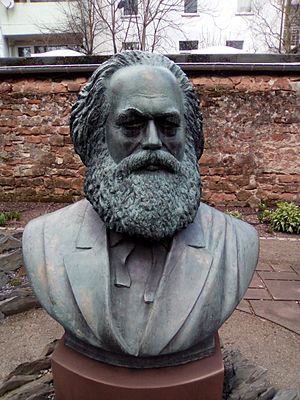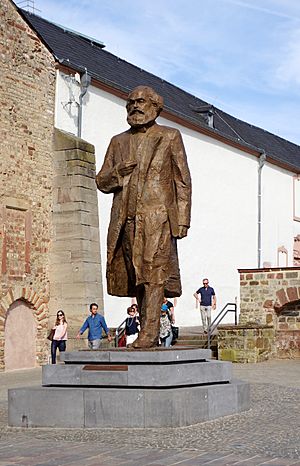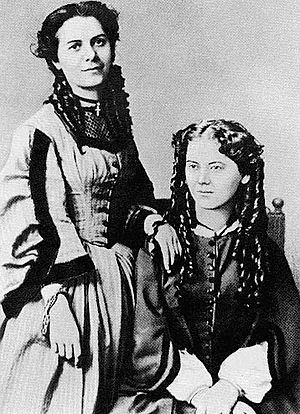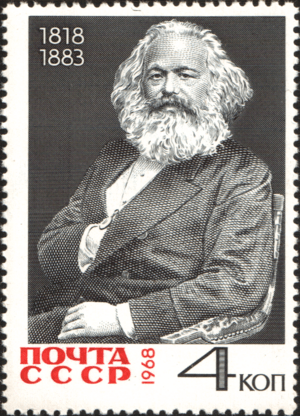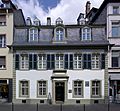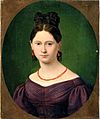Karl Marx facts for kids
Quick facts for kids
Karl Marx
|
|
|---|---|
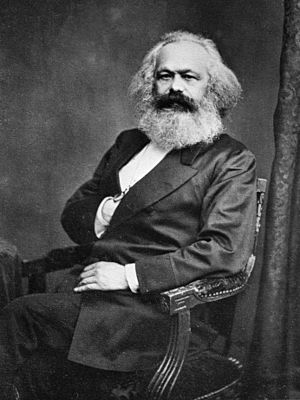
Karl Marx in 1875
|
|
| Born | 5 May 1818 |
| Died | 14 March 1883 (aged 64) |
| Resting place | Tomb of Karl Marx, Highgate Cemetery, London, England, United Kingdom |
| Nationality |
|
| Spouse(s) | |
| Children | 7, including Jenny, Laura, and Eleanor |
| Parents |
|
| Relatives |
|
|
Philosophy career |
|
| Alma mater | |
| Era | 19th-century philosophy |
| Region | Western philosophy |
| School |
|
|
Main interests
|
Philosophy, economics, history, politics |
|
Notable ideas
|
Marxist terminology, surplus value, contributions to the labour theory of value, class struggle, alienation and exploitation of the worker, materialist conception of history |
| Signature | |
Karl Marx (born May 5, 1818 – died March 14, 1883) was a very important German thinker. He was a philosopher (someone who studies big ideas), an economist (someone who studies money and how societies work), a historian (someone who studies the past), and a journalist. He also had strong ideas about how society should be changed, making him a socialist revolutionary.
Contents
Karl Marx's Life and Work
Karl Marx was born in Trier, Germany. He went to university to study law and philosophy. In 1843, he married Jenny von Westphalen.
Because of his strong political writings, Marx became stateless. This means he no longer had a country he belonged to. He had to live away from his home country. He moved to London with his wife and children.
In London, he kept working on his ideas. He often worked with another German thinker named Friedrich Engels. Marx spent a lot of time researching in the reading room of the British Museum.
His most famous writings are a short book from 1848 called The Communist Manifesto. He also wrote a longer, three-volume work called Das Kapital.
Marx's ideas about society, money, and politics are known as Marxism. These ideas have had a huge impact on history. They have influenced how people think about economics and politics.
Karl Marx's Big Ideas
Marx believed that human societies change and grow through something called class struggle. This means that different groups of people in society are often in conflict.
In a system called capitalism, he saw a conflict between two main groups. One group was the ruling class, called the bourgeoisie. They owned the factories and businesses, which are the means of production.
The other group was the working class, called the proletariat. They worked in the factories and businesses. They sold their labour power (their ability to work) for wages.
Marx used a way of thinking called historical materialism. He thought that, like older economic systems, capitalism would eventually have problems. These problems would cause it to break down.
He predicted that capitalism would be replaced by a new system called socialism. Marx strongly believed that workers should take action to change society. He thought they should work together to overthrow capitalism.
Marx's ideas have greatly influenced politics and thinking around the world. Many people have discussed and changed his ideas over time. He is seen as one of the main founders of modern social science.
Karl Marx's Family Life
Marx and his wife, Jenny von Westphalen, had seven children. However, only three of them lived to be adults. This was partly because they lived in difficult conditions in London.
Their children were:
- Jenny Caroline (1844–1883)
- Jenny Laura (1845–1911)
- Edgar (1847–1855)
- Henry Edward Guy (1849–1850)
- Jenny Eveline Frances (1851–1852)
- Jenny Julia Eleanor (1855–1898)
- One child who died very young in 1857.
According to his son-in-law, Paul Lafargue, Marx was a loving father.
Marx sometimes used fake names, or pseudonyms. He did this when renting homes to make it harder for authorities to find him. In Paris, he used "Monsieur Ramboz." In London, he signed letters as "A. Williams." His friends called him "Moor" because of his dark hair. He encouraged his children to call him "Old Nick" and "Charley." He also gave nicknames to his friends and family.
Karl Marx's Death
For the last 15 months of his life, Marx was often sick. He had a bad cold that led to bronchitis and pleurisy. These illnesses caused his death in London on March 14, 1883. He was 64 years old and still a stateless person.
His family and friends buried him in Highgate Cemetery (East) in London. This area was for people who did not follow a specific religion. In 1954, Marx and his family were reburied in a new spot nearby.
The tomb at the new site was shown on March 14, 1956. It has a famous message carved on it: "Workers of All Lands Unite".
Other pages
Images for kids
-
Marx's birthplace, now Brückenstraße 10, in Trier. The family occupied two rooms on the ground floor and three on the first floor. Purchased by the Social Democratic Party of Germany in 1928, it now houses a museum devoted to him.
-
Jenny von Westphalen in the 1830s
-
Friedrich Engels, whom Marx met in 1844; the two became lifelong friends and collaborators.
-
The first edition of The Manifesto of the Communist Party, published in German in 1848
-
The first volume of Das Kapital
-
Tomb of Karl Marx, East Highgate Cemetery, London
-
Karl Marx Monument in Chemnitz (known as Karl-Marx-Stadt from 1953 to 1990)
-
Karl Marx and Friedrich Engels monument in Marx-Engels Forum, Berlin-Mitte, Germany
See also
 In Spanish: Karl Marx para niños
In Spanish: Karl Marx para niños
 | Claudette Colvin |
 | Myrlie Evers-Williams |
 | Alberta Odell Jones |


